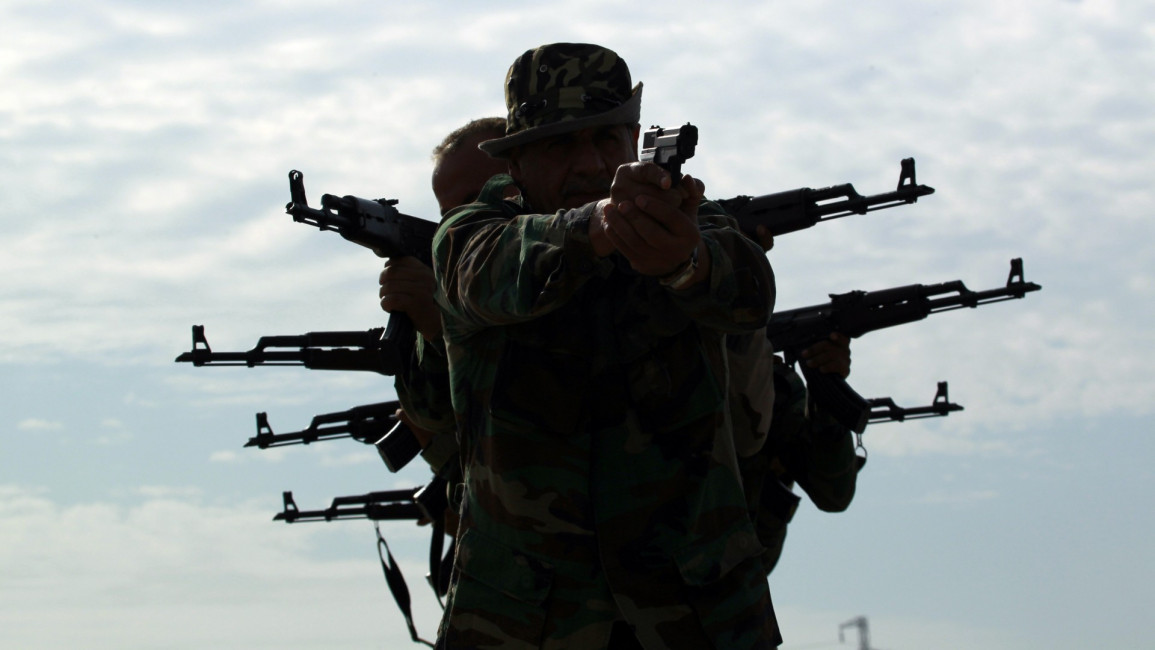Iraq launches 'Desert Lions' offensive against IS sleeper cells
Dubbed 'Desert Lions', the military operation aims to target IS sleeper cells in the desert areas of the country, a statement announced.
"Under the supervision of the Joint Operations Command, Operation Desert Lions will search the areas of Wadi Houran, Husayniyyat, Al-Kara, H2, and Wadi al-Hallcom, all the way to international borders," the statement said.
The operation was launched to "enhance security and stability in these areas, to pursue terrorist elements and to arrest those wanted", it added.
The announcement on Monday came amid a multiple IS attacks across eastern Iraq on Sunday night, resulting in heavy clashes with security and pro-government paramilitary forces that left three dead and several injured.
The sources added that a security officer was shot dead by a sniper while travelling between Al-Azim and the nearby village of Qarah Tapah.
Militants also attacked the town of Jalawla, also in Diyala governorate, in the same evening. A fierce exchange of gunfire broke out with Iraqi security forces, according to local media, however none were reported killed in the fighting.
Twitter Post
|
Read more: The Iraq Report: Protest movement revives as coronavirus lockdown eased
Iraq's Shia-dominated paramilitaries, the Popular Mobilisation Forces (PMF) - known in Arabic as Hashd Al-Shaabi - confirmed further IS activity on Sunday night.
Iraqi units were attacked in eastern Salaheddin governorate as well as in Jurf Al-Nasr, a town in the province of Babil, sixty kilometers southwest of Baghdad.
"IS militants were attempting to enter Babil province through Jurf Al-Nasr. However, their attack was foiled by the Hashd Al-Shaabi units," the PMF tweeted.
In a later tweet, the PMF claimed that they "repelled" an attack by IS in eastern Salaheddin province late on Sunday.
Meanwhile, analysts claim the militant organisation is taking advantage of the coronavirus lockdown, coalition troop withdrawals and political stagnation in Baghdad to ramp up its activities, following a spate of deadly attacks in recent weeks.
Ten Iraqi paramilitaries were killed in IS attacks north of Baghdad the previous night, the deadliest operation by sleeper cells in months.
Last week, the group claimed a suicide attack that wounded four outside an intelligence headquarters in the northern province of Kirkuk.
"Combat operations have reached a level we haven't seen in a while," said Iraqi security expert Hisham Al-Hashemi.
He said IS fighters were using abandoned villages to edge towards urban areas, looking to re-establish funding mechanisms, smuggling routes and hideouts while targeting local infrastructure and officials to cause panic.
Meanwhile in the rural Diyala region, tribespeople and farmers say attacks on farmland are taking place on a daily basis.
The escalation may be linked to security units being redeployed to enforce a nationwide lockdown aimed at curbing the spread of the novel coronavirus, which has infected more than 2,000 people and killed over 90 in Iraq.
The militants could also be exploiting the political deadlock in Baghdad, where top leaders are focused on tense talks over a new government, the consequences of a collapse in global oil prices, and budget disputes with autonomous Kurdish authorities.
Even more advantageous for the Islamic State group is the significant troop drawdown by the 7,500-strong US-led coalition, which led the offensives to counter the militants after they overran swaths of the country in 2014.



